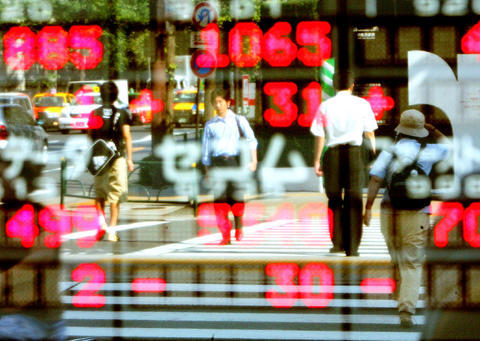Japan's and Australia's central banks injected more funds into money markets yesterday, continuing a string of such injections meant to ensure market liquidity and calm investors' fears in the wake of the US subprime mortgage crisis.
The Japanese central bank pumped ¥800 billion (US$7 billion) into money markets yesterday in its ongoing effort to curb rises in key interest rates in the face of US credit concerns. The Bank of Japan (BOJ) injected ¥1 trillion on Monday.
Major central banks, including the BOJ, as well as the US Federal Reserve and the European Central Bank, have already poured billions of dollars into the markets in recent weeks because of concerns about the possible impact of the US subprime mortgage woes' on the global economy.

PHOTO: AFP
The Japanese finance minister said he spoke by telephone with US Treasury Secretary Henry Paulson to work together closely to monitor the recent financial market turmoil.
"We've agreed that we will exchange opinions on a frequent basis, such as through telephone calls, and will closely monitor market conditions," Finance Minister Koji Omi told reporters.
The Reserve Bank of Australia also said it had injected A$3.57 billion (US$4.4 billion) yesterday through the purchase of mostly short-term securities, following a similar action on Monday.
The US Federal Reserve on Friday cut its key discount rate by half a percentage point to 5.75 percent to quell investor worries, though the action is considered a temporary remedy.
Global stock markets have mostly climbed since the rate cut, although after sharp gains on Friday in the US and Europe and on Monday in Asia, the pace has slowed.
The Dow Jones industrial average rose 0.32 percent on Monday in the US, after posting an 1.8 percent gain on Friday.
The Nikkei 225 benchmark stock index rose 168.86 points, or 1.07 percent, to close at 15,901.34 points on the Tokyo Stock Exchange yesterday. The index surged 458.8 points, or 3 percent, on Monday, posting the largest one-day point gain since June 22 last year.
Before the subprime mortgage crisis surfaced, analysts had expected the Bank of Japan to raise interest rates when it meets later this week. However, such expectations have dwindled at a time when financial authorities around the world are trying to work together to calm investors' jitters.
Omi urged the central bank to look at "the overall situation" before making a decision at the two-day monetary policy meeting scheduled to end tomorrow in what appears to be a signal from the government against a premature hike.
"I think it will make an appropriate judgment while looking at the overall situation," Omi said.

US President Donald Trump yesterday announced sweeping "reciprocal tariffs" on US trading partners, including a 32 percent tax on goods from Taiwan that is set to take effect on Wednesday. At a Rose Garden event, Trump declared a 10 percent baseline tax on imports from all countries, with the White House saying it would take effect on Saturday. Countries with larger trade surpluses with the US would face higher duties beginning on Wednesday, including Taiwan (32 percent), China (34 percent), Japan (24 percent), South Korea (25 percent), Vietnam (46 percent) and Thailand (36 percent). Canada and Mexico, the two largest US trading

China's military today said it began joint army, navy and rocket force exercises around Taiwan to "serve as a stern warning and powerful deterrent against Taiwanese independence," calling President William Lai (賴清德) a "parasite." The exercises come after Lai called Beijing a "foreign hostile force" last month. More than 10 Chinese military ships approached close to Taiwan's 24 nautical mile (44.4km) contiguous zone this morning and Taiwan sent its own warships to respond, two senior Taiwanese officials said. Taiwan has not yet detected any live fire by the Chinese military so far, one of the officials said. The drills took place after US Secretary

CHIP EXCEPTION: An official said that an exception for Taiwanese semiconductors would have a limited effect, as most are packaged in third nations before being sold The Executive Yuan yesterday decried US President Donald Trump’s 32 percent tariff on Taiwanese goods announced hours earlier as “unfair,” saying it would lodge a representation with Washington. The Cabinet in a statement described the pledged US tariffs, expected to take effect on Wednesday next week, as “deeply unreasonable” and “highly regrettable.” Cabinet spokeswoman Michelle Lee (李慧芝) said that the government would “lodge a solemn representation” with the US Trade Representative and continue negotiating with Washington to “ensure the interests of our nation and industries.” Trump at a news conference in Washington on Wednesday announced a 10 percent baseline tariff on most goods

‘SPECIAL CHANNEL’: Taipei’s most important tasks are to stabilize industries affected by Trump’s trade tariffs and keep negotiations with Washington open, a source said National Security Council Secretary-General Joseph Wu (吳釗燮) arrived in the US for talks with US President Donald Trump’s administration, a source familiar with the matter said on Friday. Wu was leading a delegation for a meeting known as the “special channel,” the Financial Times reported earlier. It marked Trump’s first use of the channel since returning to the White House on Jan. 20. Citing a source familiar with the matter, the Financial Times reported that Minister of Foreign Affairs Lin Chia-lung (林佳龍) was also a part of the delegation. The visit came days after China concluded war games around Taiwan and amid Trump’s